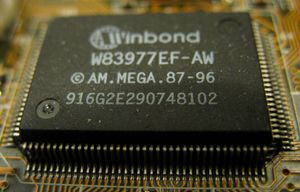Welcome to coreboot: Difference between revisions
Jump to navigation
Jump to search
mNo edit summary |
mNo edit summary |
||
| Line 48: | Line 48: | ||
[[Image:chip_devel.png]] | [[Image:chip_devel.png]] | ||
|style="vertical-align:top"| | |style="vertical-align:top"| | ||
'''Developers'''<br /><small>Get involved! Help us make LinuxBIOS better!<hr />[[Development Guidelines]] | [http://tracker.linuxbios.org/trac/LinuxBIOS/ Issue Tracker] | [http://qa.linuxbios.org/docs/doxygen.php Doxygen] | [http://tracker.linuxbios.org/trac/LinuxBIOS/browser/trunk/LinuxBIOSv2 Browse Source] | [[JTAG/BSDL Guide|JTAG]] | [[EHCI Debug Port]] | [[Distributed and Automated Testsystem|Testsystem]] | [[GSoC]]</small> | '''Developers'''<br /><small>Get involved! Help us make LinuxBIOS better!<hr />[[Development Guidelines]] | [[Developer Manual]] | [http://tracker.linuxbios.org/trac/LinuxBIOS/ Issue Tracker] | [http://qa.linuxbios.org/docs/doxygen.php Doxygen] | [http://tracker.linuxbios.org/trac/LinuxBIOS/browser/trunk/LinuxBIOSv2 Browse Source] | [[JTAG/BSDL Guide|JTAG]] | [[EHCI Debug Port]] | [[Distributed and Automated Testsystem|Testsystem]] | [[GSoC]] | [[Ideas]]</small> | ||
|} | |} | ||
| Line 58: | Line 58: | ||
[[Image:chip_status.png]] | [[Image:chip_status.png]] | ||
|style="vertical-align:top"| | |style="vertical-align:top"| | ||
'''Status'''<br /><small>Find out whether your hardware is already supported.<hr />[[Supported Motherboards]] | [[Supported Chipsets and Devices|Supported Chipsets & Devices]] | [http://qa.linuxbios.org Build Status]</small> | '''Status'''<br /><small>Find out whether your hardware is already supported.<hr />[[Supported Motherboards]] | [[Supported Chipsets and Devices|Supported Chipsets & Devices]] | [[Flashrom#Supported_devices|Devices Supported By Flashrom]] | [http://qa.linuxbios.org Build Status]</small> | ||
|} | |} | ||
Revision as of 22:24, 14 June 2007
|
LinuxBIOS is a Free Software project aimed at replacing the proprietary BIOS (firmware) you can find in most of today's computers. It performs just a little bit of hardware initialization and then executes a so-called payload, for example a Linux kernel, FILO, GRUB2, OpenBIOS, Open Firmware, SmartFirmware, GNUFI (UEFI), Etherboot, ADLO (for booting Windows 2000 and OpenBSD), Plan 9, or memtest86.
|

Contact
|





